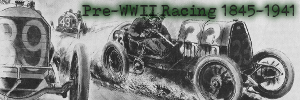















NEW RESTRICTIONS FOR AUTO RACERS |
|---|
 Topics: Indianapolis 500
Topics: Indianapolis 500
|
The New York Times
May 23, 1915
A. A. A. Hands Down Rulings—Fisher Opposed to Drivers Sharing Speedway Profits.
INDIANAPOLIS, May 22.—Rulings of vital importance to the automobile racing game have been handed down by the American Automobile Association with reference to cars entered for the next 500-mile race. The first of these is that wherever elimination trials for a race are held the driver or relief driver of a car must qualify his own machine, no man being allowed to quality more than one car. Previously, as in the case of Burman at Indianapolis last year, one man could qualify as many machines as he wished.
The second rule does away for all time with entering a car under any name other than its own for the purpose of squeezing in a fourth car when three of the same make are already entered. Under this ruling the Harroun special entered in the Indianapolis race must compete as a Maxwell, and the Burman-Peugeot as a Peugeot. This automatically eliminates one Maxwell and one Peugeot from the running.
Other important rulings, perhaps the most vital, because if carried through they will establish the right of the American Automobile Association to change the entry blanks of promoters at will, are amendments to the speedway's rule requiring front axles of all cars to be new two days before the race and the rule that eliminations are to close on Saturday, May 22. The former rule has been modified to refer only to steering arms, spindles, and connecting rods, and the latter to permit entrants to qualify as late as Monday, May 24, permitting some of the late comers to get under the wire.
The speedway has not as yet stated an opinion about the matter, Carl G. Fisher, President of the institution, being out of town and no one else being empowered to make a statement in his absence. It is thought, however, that serious friction may result.
Just at present Mr. Fisher is concerned with another matter, however. He has invited members of the new Auto Drivers' Protective Association, an organization of racing pilots founded in Indianapolis a few days ago for the purpose of sharing control of the sport with the owners of speedways and the American Automobile Association, to a conference to be held in the near future. He says he has several things he would like to say to the racing men, with the idea of inducing them to avoid any program which, in his opinion, would be detrimental to the best interests of the game. He thus believes it would be very unwise for the new association to attempt to dictate to track owners in financial matters, such as the payment of entry fees, bonuses, and the division of receipts resulting from elimination trials prior to a race.
Racing drivers, Fisher says, are already the most favored of any class of sport professionals. The prizes they compete for are larger than in any other line of sport, and with speedways being built all over the country their chance for financial emolument is unparalleled. For this reason, says Fisher, drivers should be careful not to handicap the development of the game.
